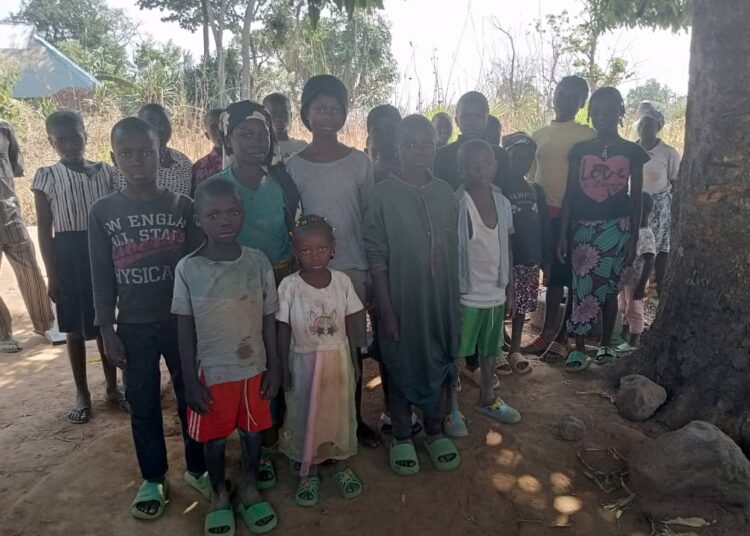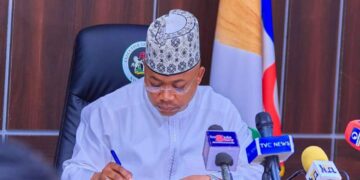KADUNA, NIGERIA -Tears drop from Victoria Titus’ face onto the cassava flour as she blends the gritty paste. Her three-year-old son, David, whimpers in her arms, his ribs stark against his shrunken frame. Over two years ago, bandits took everything from her – her husband, her village, her livelihood – and now they threaten to steal her son’s life with a weapon far more insidious: hunger.
Bandits attack on Victoria Titus’s village, Madamai, in Kaura Local Government Area (LGA) turned her life into a desolate wasteland. Her husband, alongside 34 others, fell to their machetes.
“It is not easy since my husband died. We have been at the mercy of people and the little income that comes from subsistence farming. It is really sad that I can’t provide for my children.”
Victoria’s story is not a lone tragedy, but an ugly chorus echoing across Southern Kaduna, where banditry’s bloody grip chokes the lifeblood from communities and steals childhoods and nutrition from innocent eyes.
Malnutrition tales from Madamai and Kajuru communities
Christiana Dauda’s sorrow now extends beyond the loss of her husband over three years ago. This time, malnutrition, not bandits, pose a threat to her two-year-old son’s life. Widowed during the 2021 Madamai attack that claimed 34 lives, she is faced with unimaginable hardship.
“I nearly gave up,” she said. “They took my husband, now my child has started showing signs of not being well fed… I was pregnant when my husband died. People doubted I’d survive, but somehow I did.”
With no breadwinner, Christiana began farming just a month after her breast milk started dwindling due to poor diet.
“I feared losing my son too,” she said, her eyes welling up.
“Leaving her with others while I go to the farm every day terrifies me. What if I returned to find her dead? I think this way because I can barely afford one meal a day.”
Juliana Caleb, a 30-year-old mother from Dogon Noma in Kajuru LGA, shared her plight with four children. She explained that her husband who is a peasant farmer has no additional income-generating skills, and this leaves the family vulnerable.
The family’s precarious situation, coupled with the food insecurity, serve as one of the prominent drivers of acute malnutrition within their household. Juliana lamented the heart-wrenching reality of feeding a sick child while others in the family go hungry.
“Some of my children even cry, and I have nowhere to hide,” she stressed, noting that her son battles severe acute malnutrition (SAM).
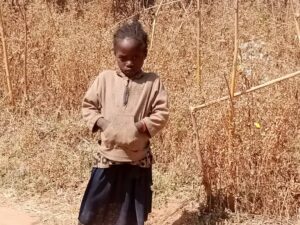
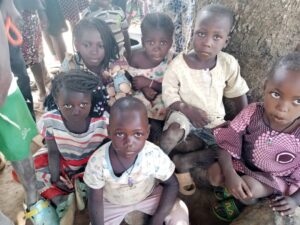
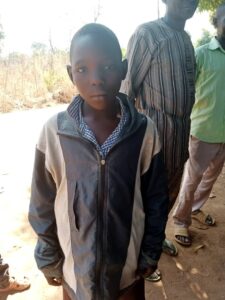
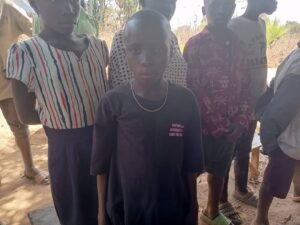
Janeth Mairabo, a 27-year-old petty trader from Kujeni community in Kajuru shared her sadness over her two-year-old daughter’s malnourishment. Janeth, a petty trader, expressed deep sadness as she described her daughter’s weight, likening it to that of a piece of paper.
“People around here don’t like carrying my baby because they say she is very thin and weak. Many people in the community doubt that she will survive, but we are surviving by the grace of God,” Janeth said.
Janeth said she feeds her daughter, Endurance, with pap and any other food she can afford at home.
Lami Hosea, 32, another resident of Dogo Noma, recounted her struggles with her nine-month-old malnourished baby. Believing she was providing good nutrition; Lami was devastated when her baby’s health started deteriorating.
“My baby is always falling sick, and she looks thin and weak. A visit to the nearby chemist shop revealed that my child’s weight was very low. I was encouraged to provide her with protein, sometimes sacrificing my own meals and those of my other children to scrape together enough money for baby milk.”
The story of 13-year-old Caleb Gideon whose mother was killed by bandits in 2021 is also pathetic. Caleb who looked visibly malnourished narrated how his father gave him and his siblings salt water to drink at night due to lack of food.
In his words: “Most times my father often put salt in water for us to drink and sleep because there is no food at home. Sometimes I and my siblings go to bed hungry. My father is a peasant farmer, we only eat twice during harvest period but around April to August every year we usually eat once a day. We live at the mercy of others.”
Mrs. Esther Andrew, a 35-year-old widow caring for six children, revealed the uphill battle she faces in preserving the life of her malnourished 2-year-old daughter. Lamenting the absence of a nearby primary healthcare center and her inability to cover private hospital expenses, she resorts to treating her daughter with herbs. Despite the challenges, Mrs. Andrew remains hopeful that her daughter will recover soon.
“It’s not easy seeing one’s child suffering from malnutrition. Sometimes I regret coming to this world. There is no Primary Healthcare Centre (PHC) in our community. Each time I need any medical attention for my daughter, I make use of herbs to treat her because there is no PHCs here and even the private hospital at Mallagum I can’t afford to pay for the bills.”
More bitter tales from Madamai residents
Madamai residents find themselves grappling with the devastating aftermath of relentless banditry attacks, resulting in displaced children and shattered families. Situated approximately 10 kilometers from Kaduna town, the community stands as a chilling testament to the glaring absence of government’s intervention.
Investigation into the plight of Madamai residents revealed a litany of challenges, with inadequate infrastructure standing out as a critical issue. Poor road network, unreliable water sources, the absence of a primary healthcare center (PHC), and the lack of educational facilities compound their already dire situation.
Katoh Michael, the youth leader of the community, vividly portrays the painful reality they endure.
“We are a forgotten people,” he said, “Our roads are in such a state that even those with the best intentions are deterred from helping us. This inaccessibility hinders crucial aid, especially from NGOs and good spirited individuals.”
He shared a distressing incident during an attack, where assistance from a neighboring village and the military was hampered by the deplorable road conditions. Expressing frustration at government neglect, the youth leader said “Despite occasional help from NGOs, we have not witnessed any tangible intervention from the government.”
The litany of challenges faced by Madamai residents extends to the most fundamental aspects of their daily lives. Katoh emphasized that, ” No water for our children. The absence of PHCs compounds our woes. With no borehole in our community, both humans and livestock are forced to share water sources, posing significant health risks.”
Even attempts to engage in farming are thwarted.
Katoh stressed how crops are often destroyed by cows from nomadic livestock herders. “Our survival hinges on God’s mercy as we navigate these challenges with little support,” he said.
Education is also not left out. In a world where education is seen as a lifeline out of poverty, the children of Madamai find themselves adrift. The local school, LEA Primary School, once a bustling center of learning, has been eerily silent since 2021 due to the relentless banditry activities plaguing the community.
Approximately 300 children in Madamai are deprived of basic education. The youth leader lamented:
“It has been about three years now that the primary school stopped functioning. We pushed our children down to Mallagum, where some of them trek 10 to 15 kilometers for schooling. We want to bring back our children to continue their primary education here in the community because the distance is too far for small children to trek.
“We have about 50 children whose both parents were killed by bandits. Some of them survive just by the grace of God and it is difficult to supervise 50 children to and from school over a long distance.”
Despite previous govt interventions malnutrition persist
Malnutrition remains a pressing issue in Kaduna State despite efforts to combat it. Malnutrition is lack of proper nutrition caused by not having enough to eat, not eating enough of the right things.
Malnutrition refers to eating foods that lack of proper nutrition. This is caused by not having enough to eat and not eating enough of the right things. The World Health Organisation (WHO) refers malnutrition to deficiencies, excesses or imbalance in person’s intake of nutrients and energy. Malnutrition occurs when the body doesn’t get enough nutrients.
The Kaduna State manager of the World Bank-backed Accelerating Nutrition Results in Nigeria (ANRiN) project, Dr Zainab Muhammad-Idris, in an interview with this newspaper disclosed that ANRiN has successfully distributed over 21,000 cartons of ‘ready-to-use therapeutic food’ (RUTF) across the State, preventing malnutrition in children under the age of 5.
However, consistent budgetary allocations for nutrition have fallen short. The allocations for 2020, 2021, and 2022, were N5.94bn, N1.97bn, and N2.56bn respectively. A non-governmental organization (NGO) working to achieve food and nutrition security, Civil Society Scaling Up Nutrition in Nigeria (CS-SUNN), highlighted the insufficient funding for nutrition initiatives in specific Ministries, Departments, and Agencies (MDAs) in the state in its 2022 trend analysis report.
Despite governmental efforts, Kaduna contends with elevated rates of malnutrition, necessitating urgent attention to basic amenities in Madamai community and its environs. Over the same period, KADENAP claimed it has provided treatment for more than 82,000 children battling malnutrition and reached 500,000 individuals with crucial nutrition messages, official records by indicate that 1,423 lives were lost due to malnutrition in the state from 2017 to 2022.
According to UNICEF, Nigeria has the second highest burden of stunted children in the world, with a national prevalence rate of 32 percent of children under five. An estimated 2 million children in Nigeria suffer from severe acute malnutrition (SAM), but only two out of every 10 children affected is currently reached with treatment. Seven percent of women of childbearing age also suffer from acute malnutrition.
In Kaduna State, a survey by Nigerian Journal of Nutritional Sciences 2021 estimates that 47% of children under five were stunted, 34% underweight.
A report by Alive&Thrive, an initiative fighting malnutrition in 2022 stated that in Kaduna State 41.7% of children under five are severely acutely malnourished and 14.6% are born with low weight.
According to WHO, child stunting refers to a child who is too short for his or her age as a result of chronic or recurrent undernutrition which is usually associated with poor nutrition and maternal health, frequent illness and or inappropriate feeding and care in early life. Stunting prevents children from reaching their physical and cognitive potential.
Stunting is an indication of chronic under-nutrition, which is caused by a prolonged period of hunger or disease. Stunting, which reflects a failure to grow in stature also causes mental growth retardation.
The first 1,000 days of a child’s life, from conception to two years of age, are very critical. It is considered that a baby who lacks essential nourishment during this period that the brain is developing rapidly may have mental retardation that is irreversible.
Scientific evidence shows that stunted children are more likely to have cognitive deficiencies and poor learning outcomes. A report by the Save the Children shows that malnourished children score 7% lower in mathematics tests, are 19% less likely to be able to read at age 8 and are 13% less likely to be in the appropriate grade for their age than those who are well nourished.
Scientists say that stunted children grow into adults with irreversible losses in human capital that also contribute to future losses in economic productivity.
Reacting to why interventions in the sector are not yielding much results, Hajia Aisha Abubakar Sadiq, the Permanent Secretary, Kaduna State Ministry of Health, pinpointed poverty, insufficient knowledge on proper food preparation, and the high cost of nutritious food, particularly protein-rich options containing essential vitamins and minerals, as key factors in the state’s malnutrition challenges.
“There is an urgent need for increased availability of crops fortified with essential nutrients. Supporting farmers through subsidies is crucial to ensuring the production of necessary crops, providing our communities with the required nutrients,” she stressed in an interview with this reporter.
Hajia Aisha underscored the critical need to strengthen school feeding programs, recognizing the ongoing initiative in the state. However, she highlighted significant challenges, including insufficient funding and mismanagement of food providers.
She acknowledged that the school feeding program in the state is faced with formidable challenges of inadequate funding and poor management of food providers and would require a more robust strategy to ensure that it addresses malnutrition amongst other objectives.
How Kaduna govt can prevent malnutrition – Expert
Addressing the prevailing malnutrition crisis, nutrition expert Mohammed Hassan Sani stressed the importance of tackling its root causes. He pinpointed poverty and illiteracy as fundamental contributors to malnutrition in the state, emphasizing that poverty spawns insecurity.
Sani urged both federal and state governments to prioritize food security as their foremost concern. Expressing concern over the removal of subsidies on agriculture, particularly the soaring cost of fertilizer at N30,000 per bag, he called for the establishment of structures ensuring food security. Sani stressed the necessity for interventions in agriculture, subsidy reviews on fertilizers, and the overall safety of lives and property.
Emphasizing the need for increased investment in agriculture to combat malnutrition, Sani urged the government to take decisive action.
“The government must establish structures that will make sure of food security. Put in place intervention on agriculture, review subsidy on fertilizer at the national and state levels and ensure safety of lives and property.”
Another nutrition expert, Bartholomew Jessica, highlighted factors contributing to malnutrition in the state during an interview with this reporter. The immediate causes include inadequate dietary intake and diseases.
“We also have underlining causes at the household or family level which includes insufficient access to food, inadequate maternal and childcare services and poor water, sanitation, and inadequate health services.
“Then the basic causes at the societal level includes inadequate use of potential resources such as environment, technology, people; and lack of quantity and quality of actual resources such as human beings.
She further advised that increased investment in nutrition, timely release and cash backing of nutrition funds will also go a long way in fighting malnutrition.
“Create awareness of the dangers of malnutrition across all communities. The government should as a matter of priority engage skilled health workers to provide services at the community level. The government should also train Traditional Birth Attendants (TBAs) to provide optimum care services to pregnant and lactating mothers. There is also need for community sensitization to households on the importance of using locally available food during and after pregnancy,” she said.
The Permanent Secretary, Kaduna State Ministry of Health, Hajia Aisha Abubakar Sadiq during an interview with this reporter identified poverty, lack of knowledge and proper way to prepare the right food as the major causes of malnutrition in the State.
She said that the cost of foodstuffs is high all over the world, adding that most people cannot afford to buy the highly nutritious food like proteins that contain the required vitamins and minerals needed in the body.
When asked on how to reduce malnutrition in Kaduna, Hajia Sadiq said that “there is need for greater availability of crops that are fortified with the essential nutrients and subsidy support for farmers so that they can produce necessary crops we need, to provide us with the adequate nutrients.
“There is need to help in school feeding. There is an existing school feeding programme in the state but it is marred by inadequate funding, poor management of the food providers. There is need to intensify the modification of the food they provide in the school feeding programme. also to provide them with regular payment so that they can do what they are suppose to do”.
“So many children now go to school hungry. We need to educate people on food groups on how to prepare it and the right amount to give to children, frequency and the signs of malnutrition,” she stated.
*This report was done with the support of the International Centre for Investigative Reporting, under its Promoting Democratic Governance in Nigeria Project.
*****END****
We’ve got the edge. Get real-time reports, breaking scoops, and exclusive angles delivered straight to your phone. Don’t settle for stale news. Join LEADERSHIP NEWS on WhatsApp for 24/7 updates →
Join Our WhatsApp Channel

